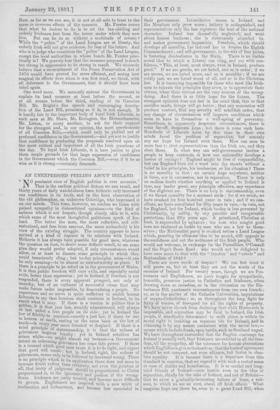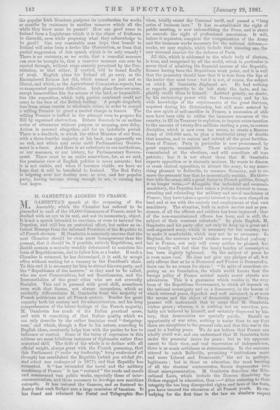AN UNEXPRESSED FEELING ABOUT IRELAND.
"N0 pessimist view of English politics is ever accurate." That is the earliest political dictum we can recall, and thirty years of daily watchfulness have hitherto only increased our confidence in its truth, and in the keen observation of the old philosopher, an unknown Coleridge, who impressed it on our minds. This time, however, we confess we listen with pained sympathy to disheartened opinionsâto the kind of sadness which is not despair, though closely akin to it, with which some of the most thoughtful politicians speak of Ire- land. The better the man, the more reflective, and self- restrained, and free from rancour, the more melancholy is his view of the existing struggle. The country appears to have arrived at a kind of impasse in its relations with Ireland. Hitherto it has always been possible for good men, whatever the question on foot, to desire some definite result, to see some plan they would prefer adopted, if only circumstances would allow, or at least to discern some principle to which they could tenaciously cling ; but to-day principles seemâit can be only seemingâto be almost as untrustworthy as plans. If there is a principle to De relied on in the government of States, it is that public freedom will cure evils, and especially social evils, better than repression ; yet in Ireland, if freedom is not Suspended, there is every apparent prospect, not only of anarchy, but of an outburst of successful crime that may make future order impossible, by demoralising a people. No experience and no nerve is quite sufficient to enable honest Liberals to say that freedom shall continue in Ireland, be its result what it may. If there is a maxim in politics that is golden, it is that just law, steadily administered, will always at last enlist a free people on its side ; yet in Ireland the law of fidelity to contractâsurely a just law, if there be one in heaven or earth, resting on the same basis as the law of truthâis every year more detested or despised. If there is a tried principle of statesmanship, it is that the redress of grievances inspires loyalty ; yet in Ireland rebellion has arisen whileâwe might almost say becauseâa Government intent on redressing grievances has come into power. If there is a counsel which good men trust, it is to do right, and expect that good will result ; but in Ireland, right, the redress of grievances, seems only to be followed by increased wrong. There is no principle which in its application there does not seem to increase doubt rather than certainty, not even the greatest of all, that lenity of judgment should be proportioned, as Christ proportioned it, to the ignorance and passion of the wrong- doers. Irishmen are justly treated, and become more difficult to govern. Englishmen are inspired with a new spirit of moderation and forbearance, and become less successful in
their government. Intimidation ceases in Ireland, and the Members only grow worse ; bribery is extinguished, and representatives only the less represent the best of the national character. Ireland was shamefully neglected,' and went about honest business ; she is strenuously attended to, and makes government impossible. Freedom, which should develops all morality, has induced her to despise the Eighth Commandment ; and self-government, in the way of free juries, is fostering disobedience to the Sixth. There is no visible moral idea to which a Liberal can cling, and say with con- fidence, " This, at least, must always, even in Ireland, produce good." If we are gentle, we are hated, and so is order ; if we are severe, we are hated more, and so is morality ; if we are coldly just, we are hated worst of all, and so is the Christian law. It is becoming impossible for those who most like Irish- men to tolerate the principles they avow, or to appreciate their virtues, when their virtues are the very sources of the wrong- doing. And there is so little hope for the future. The strongest optimist does not feel in his mind that, this or that sacrifice made, things will go better ; that any concession will produce content, that any severity will establish order, that any change of circumstances will improve conditions which seem to have in themselves a well-spring of perversity. Sometimes, in apparently desperate circumstances, there is some far-off, desperate hope ; but there is none such here. Hundreds of Liberals have by this time in their own minds faced the problem of separation, but scarcely any sea hope for Ireland even there. How can men be more free to elect representatives than the Irish are, and they elect these. In what way can self-government incline a people to keep contracts, or how can nationality develops a horror of outrage ? England might be free of responsibility, but can England turn out a ward into the streets without a belief in his principles, his tendencies, or his situation ? There is no morality in that ; no certain hope anywhere, neither in force, nor in concession, nor in separation. There is only an endless doubt whether anything as applied to Ireland is true, any leader great, any principle effective, any experience of the slightest use. There is no help in statesmanship, even if we thrust morality for a moment aside ; for if we crush, we have crushed for four hundred years in vain ; and if we con- ciliate, we have conciliated for fifty years in vain,âin vain, not for England, but for Ireland, which to-day is less governed by Christianity, by utility, by any genuine and recognisable patriotism, than fifty years ago. A priesthood, Christian at least, is superseded by agitators ; the men who sought good laws are traduced as feeble by men who are a law to them- selves ; the Nationalist party is crushed before a Land League which, granting its ultimate idea to be sound, still appeals to the sordidness and not the nobleness of the Irish people. Who would not welcome, in exchange for the Parnellites, O'Connell and the Pope's Brass Band ; who would not be delighted to have once more to deal with the " fanatics " and " rebels " and Nationalists of 1848 ?
These are mere words of despair ? We can but trust it will prove so, but at least they are not the words of the enemies of Ireland. For twenty years, though we are Pro- testants and Englishmen, we Jiave fought for sympathetic, honorific, generous justice to Catholics and Irishmen, often drawing down on ourselves, as in the discussion on the Dis- turbance Bill, passionate remonstrances from our own friends ; or, as in the matter of the Catholics Universities, imputations of crypto-Catholicism ; or, as throughout the long fight for fixity of tenure, of disregard for all the rights of property. We have never shrunk from declaring that while Home-rule is impossible, and separation may be fatal to Ireland, the Irish people, if steadfastly determined to walk alone, is within its moral right in insisting on separate life for Ireland, and in obtaining it by any means consistent with the moral law,â means which include frank, open battle, such as Scotland waged. We have throughout contended that the English contempt for Ireland is morally evil, that Irishmen are entitled to all the free- dom, all the sympathy, all the tolerance for honest aberrations which Englishmen give to themselves ; that the basis of agreement should be not conquest, not even alliance, but fusion in abso- lute equality. It is because there is a departure from this standard in coercion, that we regard it with such a rooted sense at once of dislike and humiliation. It is as cordial and long- tried friends of Irelandâmen hostile even to the idea of separation, chiefly for the sake of Ireland, and not of Britainâ that we avow a gradually-increasing failure of hope, a sad- ness, to which we see no cure, about all Irish affairs. What sanguine hope can there be, even in a great Land Bill, when
the popular Irish Members postpone its introduction for weeks or months by resistance to another measure which all the while they know must be passed? How can good come to Ireland from a Legislature which it is the object of Irishmen to discredit, even while proposing what they acknowledge to be good ? Can any reasonable man hope that benefit to Ireland will arise from a device like Obstruction, or from that partial suppression of free speech which is its only remedy ? There is no certainty, as we write, that a remedial measure can ever be brought in, that a coercive measure can ever be carried through, without steps scarcely permitted by the Con- stitution, or that either, if carried, will be found finally of avail. English plans for Ireland all go awry, as the Encumbered Estates Act did, which seemed so just and so liberal, and which, as the Agricultural Commission reports, has so exasperated agrarian difficulties. Irish plans there are none, except immoralities like the seizure of the land, or impossibili- ties like separation, which both parties combined could not carry in the face of the British feeling. A people singularly free from crime resorts to wholesale crime, in order to compel a willing Premier to grant a needed change in tenure. The willing Premier is baffled in the attempt even to propose his Bill by organised obstruction. Debate descends to an endless series of utterances without purpose or meaning, save delay. Action is arrested altogether, and for an indefinite period. There is a deadlock, to which the ablest Minister of our time, with a three-fourths majority at his back, can apparently see no end, and which may recur until Parliamentary Govern- ment is a farce. And there is no substitute in our institutions, or our manners, or our history, for Parliamentary Govern- ment. There must be an outlet somewhere, for, as we said, the pessimist view of English politics is never accurate ; but it is not visible, and when it becomes visible, we have no hope that it will be beneficial to Ireland. The Bad Fairy is reigning over her destiny now, as ever, and her popular party, having become strong enough to act, is raining her best hopes.







































 Previous page
Previous page